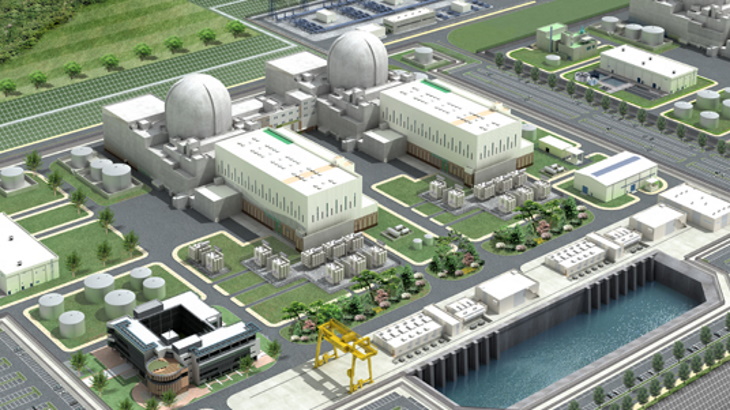Korea Hydro & Nuclear Power (KHNP) and Doosan Enerability have signed a KRW2.9 trillion (USD2.3 billion) contract for the supply of the main equipment for units 3 and 4 of the Shin Hanul nuclear power plant, South Korea's Ministry of Trade, Industry and Energy (MOTIE) announced. Construction of the units - plans for which were suspended in 2017 - is due to begin next year.

An artistic impression of Shin Hanul 3 and 4 (Image: KHNP)
Under the contract - which will run for 10 years - Doosan Enerability will supply the nuclear reactors, steam generators and turbine generators for the two APR1400 units.
Doosan Enerbility has already pre-ordered KRW45 billion worth of this work with its subcontractors, and plans to place orders for approximately KRW210 billion worth of additional work this year.
In November 2014, KHNP signed an agreement with Ulchin County to build Shin Hanul 3 and 4. The company applied for a construction licence for the units in January 2016. Site preparation for the two units was scheduled to begin May 2017, with commercial operation of unit 3 scheduled for December 2022, with unit 4 following a year later.
However, KHNP announced in May 2017 that it had instructed Kepco Engineering & Construction - which signed a design contract in March 2016 - to suspend work for the planned Shin Hanul 3 and 4 units as a result of the then new President Moon Jae-in's policy of phasing out nuclear power. Work towards licensing the new units was to continue.
President Yoon Suk-yeol - who assumed power in May 2022 - vowed to reverse former President Moon Jae-in's policy of phasing out nuclear power. In July last year, Yoon encouraged a speedy restoration of the country's "nuclear power plant ecosystem" after Minister of Trade, Industry and Energy Lee Chang-yang set out plans for revitalising South Korea's nuclear power industry, including the aim for work on Shin Hanul 3 and 4 to resume as early as 2024.
MOTIE noted that, whereas in the past it took 30 to 37 months from the initial review of a contract to the final conclusion, this time it was drastically shortened to 8 months "through a drastic increase in contract review personnel and concurrent promotion of contract conditions and price negotiations, thereby helping to quickly overcome the shrinking ecosystem".
It added: "The construction of Shin Hanul units 3 and 4 is progressing with a sense of speed with the goal of completing the environmental impact assessment within the first half of this year, approval of the power source development project implementation plan in July at the earliest, and commencement of subsequent site preparation work.
"In particular, with this contract, by starting to manufacture core components such as nuclear reactors and steam generators, which take a long time to design and manufacture, construction projects aimed at completion in 2032-2033 (units 3 and 4) are expected to be completed without a hitch."
Last year, MOTIE and related organisations provided emergency financial funds worth KRW400 billion to small and medium-sized companies involved in the nuclear industry "experiencing business difficulties in the aftermath of nuclear power plant phase-out". The ministry announced a low-interest special financial programme worth KRW200 billion will be launched on 31 March to provide further assistance.
Minister of Industry Lee Chang-yang said: "We expect that nuclear power companies that have been struggling with this [nuclear phase out] policy will take off again. The government will speed up the complete normalisation of the nuclear power plant ecosystem within the year."